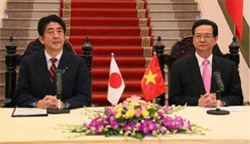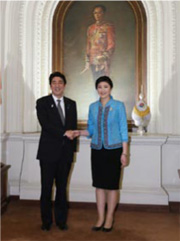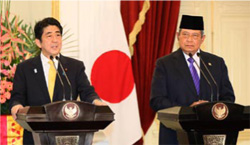Home > Highlighting JAPAN > Highlighting Japan FEBRUARY 2013 > Diplomacy Starts with Southeast Asia
Highlighting JAPAN
PRIME MINISTER'S DIARY
Diplomacy Starts with Southeast Asia
On his first overseas trip after taking office, Prime Minister Shinzo Abe officially visited three Southeast Asian countries—the Socialist Republic of Vietnam, the Kingdom of Thailand and the Republic of Indonesia—from January 16 to 18.

Prime Minister Abe speaks alongside Prime Minister of Vietnam H.E. Mr. Nguyen Tan Dung.
On January 16, Prime Minister Shinzo Abe visited the Socialist Republic of Vietnam. This year marks the 40th anniversary of the establishment of diplomatic relations between Japan and Vietnam. Prime Minister Abe held a meeting with Prime Minister of Vietnam H.E. Mr. Nguyen Tan Dung at the Prime Minister's office. At the meeting, Prime Minister Abe said that Vietnam was an important partner for Japan with shared regional challenges and a mutually complementary economic relationship. The two leaders shared the recognition that both sides would further advance their "Strategic Partnership," strengthen their cooperation, and work together to ensure peace and stability and achieve prosperity in the Asia-Pacific.
Prime Minister Abe expressed the commitment that Japan would continue its support for Vietnam's economic and social development and conveyed Japan's intention to provide Vietnam with new yen loans of up to about 500 million US dollars (46.6 billion yen) for the implementation of three projects. Prime Minister Dung expressed his appreciation for the loan. The two leaders shared the perception that both sides would further their cooperation in trade, investment, infrastructure development and other fields.

Prime Minister Abe shakes hands with Prime Minister of Thailand H.E. Yingluck Shinawatra.
On January 17, Prime Minister Abe met Prime Minister of Thailand H.E. Ms. Yingluck Shinawatra at her office.
At the meeting, Prime Minister Abe pointed out that Thailand was the largest hub of Japanese corporate activities in Southeast Asia as well as an important partner for Japan, sharing fundamental values such as democracy and the market economy and economic interests. The two leaders shared the recognition that both sides would further advance their "strategic partnership," strengthen their cooperation, and work together to ensure peace and stability and achieve prosperity in the Asia-Pacific.
The two leaders shared the view that their countries would closely cooperate with each other for the smooth operation of the Japan-Thailand Economic Partnership Agreement, infrastructure development in Thailand and other matters. On infrastructure projects, both leaders exchanged views on various issues, especially flood control, railways, satellites, and information and communication technology (ICT).

Prime Minister Abe speaks alongside Republic of Indonesia President H.E. Dr. Susilo Bambang Yudhoyono.
On January 18, Prime Minister Shinzo Abe visited the Republic of Indonesia and held a summit meeting with President H.E. Dr. Susilo Bambang Yudhoyono at the Merdeka Palace.
At the meeting, the two leaders shared the recognition that both countries would promote cooperation in the fields of (a) the economy, (b) politics and security, and (c) people-to-people exchanges on the occasion of this year's 55th anniversary of the establishment of diplomatic relations between Japan and Indonesia, and that they would further strengthen the bilateral "strategic partnership."
Referring to cooperation in the economic sector, Prime Minister Abe pointed out that the development of Indonesia was a driving force of regional economic growth and important for the rehabilitation of the Japanese economy as well. He expressed his expectations that Indonesia would adopt appropriate macroeconomic policy and improve the country's investment environment. Concerning infrastructure development in the Jakarta Metropolitan Area, both leaders shared the view that Japan and Indonesia would promote cooperation for the swift and smooth implementation of the "MPA (Metropolitan Priority Area) Strategic Plan" agreed to by the two countries.
Five Principles of Japan's ASEAN Diplomacy
At his meetings with the leaders of the countries visited, Prime Minister Abe conveyed the message that Japan would work together with ASEAN as its equal partner in pursuit of prosperity in the Asia-Pacific region through the realization of universal values such as freedom, democracy, basic human rights and the rule of law, and through a network of economic partnerships in order to ensure regional peace and prosperity in light of the changing strategic environment in this region. From that point of view, Prime Minister Abe announced on January 18 "Five Principles of Japan's ASEAN Diplomacy" after the Japan-Indonesia summit meeting.
(1) Firstly, to protect and promote together with ASEAN member states universal values, such as freedom, democracy and basic human rights.
(2) Secondly, to ensure in cooperation with ASEAN member states that the free and open seas, which are the most vital common asset, are governed by laws and rules and not by force, and to welcome the United States' rebalancing to the Asia-Pacific region.
(3) Thirdly, to further promote trade and investment, including flows of goods, money, people and services, through various economic partnership networks, for Japan's economic revitalization and prosperity of both Japan and ASEAN member states.
(4) Fourthly, to protect and nurture Asia's diverse cultural heritages and traditions.
(5) And fifthly, to promote exchanges among the young generations to further foster mutual understanding.
© 2009 Cabinet Office, Government of Japan






